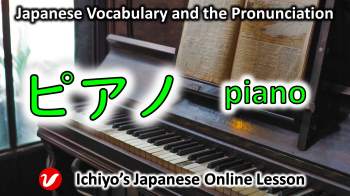The Japanese vocabulary「ピアノ (piano)」means “piano.” Please learn the pronunciation and the example sentences.
Japanese Vocabulary and the Meaning
If you do not know why the cell with “Hiragana” is blank, please read this page.
| Key Word | ピアノ |
| Hiragana | |
| Romaji Reading | piano |
| English Meaning | piano |
The Correct Japanese Pronunciations
Please learn the pronunciation by watching the attached video. You can also learn example sentences.
Our main YouTube channel: Ichiyo’s Japanese YouTube Channel
Our sub-YouTube channel (Japanese vocabulary videos): Ichiyo’s Subchannel
The Example Japanese Sentences
It is important to have skills in both non-honorific and honorific languages in order to use Japanese correctly.
I practiced the piano for 5 hours yesterday.
Plain Form:
昨日はピアノを五時間練習した。
Kinō wa piano o gojikan renshū shita.
Polite Form:
昨日はピアノを五時間練習しました。
Kinō wa piano o gojikan renshū shimashita.
The piano concert starts from 7 p.m.
Plain Form:
ピアノの演奏会は夜七時からだ。
Piano no ensōkai wa yoru shichi-ji kara da.
Polite Form:
ピアノの演奏会は夜七時からです。
Piano no ensōkai wa yoru shichi-ji kara desu.
I was moved when I listened to the piano performance.
Plain Form:
ピアノの演奏を聴いて感動した。
Piano no ensō o kīite kandō shita.
Polite Form:
ピアノの演奏を聴いて感動しました。
Piano no ensō o kīite kandō shimashita.
I have been taking piano lessons once a week.
Plain Form:
ピアノのレッスンを週に一度受けている。
Piano no ressun o shū ni ichido ukete iru.
Polite Form:
ピアノのレッスンを週に一度受けています。
Piano no ressun o shū ni ichido ukete imasu.
My piano teacher was so strict that I started to hate the piano.
Plain Form:
ピアノの先生が厳しすぎてピアノが嫌いになった。
Piano no sensei ga kibishi sugite piano ga kirai ni natta.
Polite Form:
ピアノの先生が厳しすぎてピアノが嫌いになりました。
Piano no sensei ga kibishi sugite piano ga kirai ni narimashita.

